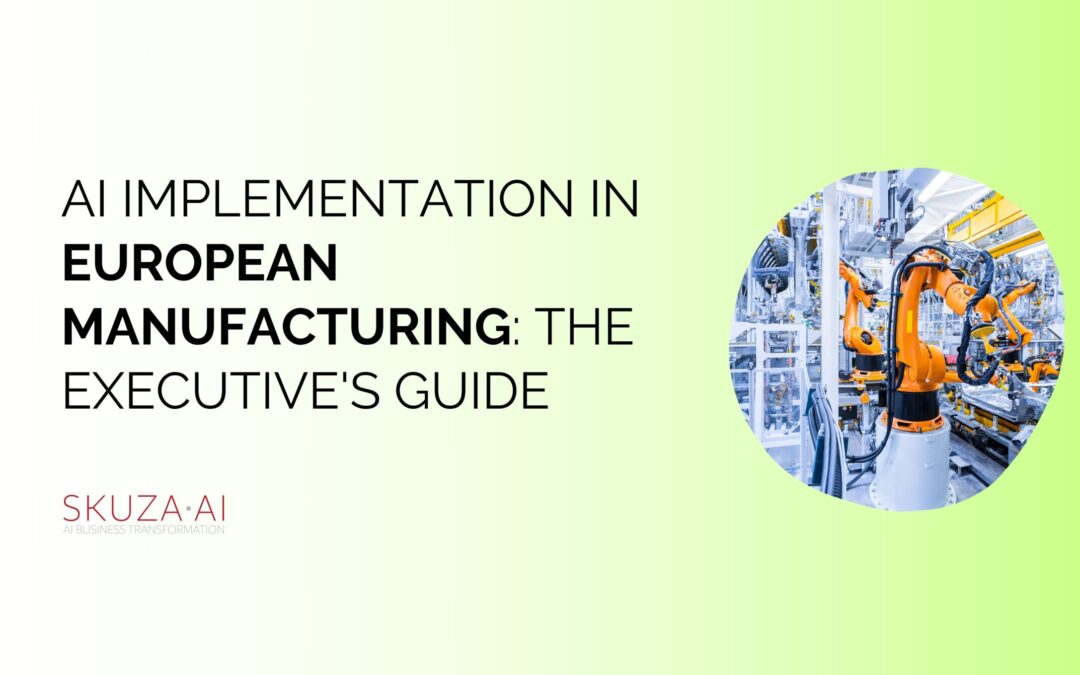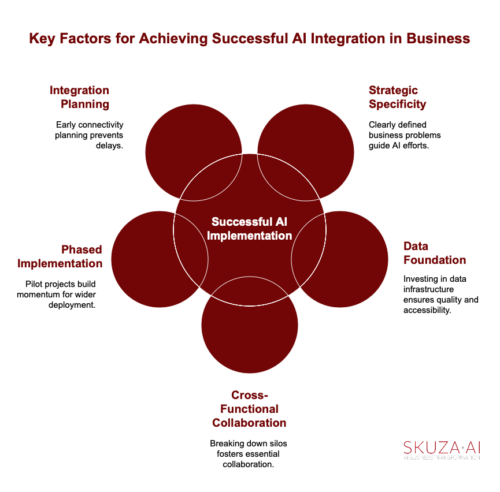Artificial intelligence is transforming European manufacturing with unprecedented potential, yet many executives struggle to convert AI investments into tangible outcomes. The gap between ambition and execution remains substantial, with successful implementations distinguished not by technological prowess but by strategic alignment and methodical execution.
Beyond the Hype: Why AI Matters for Manufacturing
European manufacturers are turning to AI for concrete business imperatives rather than technological novelty. Predictive maintenance systems are reducing downtime by up to 20%, directly impacting the bottom line by preventing costly production interruptions. Quality control applications powered by computer vision are detecting subtle defects with precision that surpasses human capabilities, essential in industries where perfection is non-negotiable. Meanwhile, AI-optimized supply chains are enabling inventory reductions of 10% while simultaneously decreasing waste – a dual victory for profitability and sustainability.
These applications share a common thread: they address specific, measurable business problems rather than implementing AI for its own sake. The German automotive manufacturer that successfully deployed predictive maintenance didn’t begin with a mandate to “use AI” – they began with the challenge of minimizing unplanned equipment failures and found AI to be the most effective solution.
Key Drivers for AI Adoption in Manufacturing
Manufacturing companies across Europe are increasingly turning to artificial intelligence driven by several compelling factors. The need for predictive maintenance stands as a primary driver, as unplanned equipment downtime leads to substantial production delays and increased repair expenses. AI’s ability to analyze sensor data and predict potential failures before they occur allows manufacturers to schedule maintenance optimally, minimizing disruptions and delivering tangible ROI by preventing costly breakdowns.
Enhanced quality control represents another critical driver. As products become more intricate and quality standards more stringent, traditional manual inspection methods prove inadequate. AI-powered systems utilizing computer vision analyze products with greater accuracy and speed, identifying subtle defects that human inspectors might miss, thereby improving product quality and reducing waste.
Supply chain optimization has become increasingly urgent, with modern global supply chains requiring more resilient and agile management. AI algorithms analyze vast amounts of data to provide accurate demand forecasts, enabling manufacturers to optimize inventory levels and proactively mitigate potential disruptions.
Furthermore, process optimization through AI analysis of real-time factory floor data identifies bottlenecks and inefficiencies that might not be apparent through traditional monitoring. The increasing consumer demand for customization is also driving AI adoption, as manufacturers seek to offer mass customization without significant cost increases. Finally, many European manufacturers are leveraging AI to address critical labor shortages by automating repetitive tasks and allowing human employees to focus on more complex activities.
The Implementation Reality Check: Common Challenges and Pitfalls
While the potential benefits of AI in manufacturing are substantial, the implementation journey is frequently underestimated and fraught with challenges. One of the most significant hurdles is the persistent skills gap, with manufacturing companies struggling to attract and retain specialized talent in data science, machine learning, and robotics. Younger workers with AI expertise often prefer roles in other sectors perceived to offer higher salaries or more research-oriented opportunities.
Integration difficulties present another common pitfall. Many manufacturing facilities rely on older machinery and IT infrastructure, and ensuring seamless interoperability between these legacy systems and modern AI solutions often becomes a frustrating and expensive process. AI development largely occurs outside the manufacturing context, making new AI inventions not always easily transferable to shop floor setups.
Data quality issues represent a significant challenge, as AI algorithms heavily rely on high-quality data to make accurate predictions. Many manufacturers collect large volumes of data, but this information is often siloed across different systems and lacks the necessary quality or context for effective AI implementation.
Implementing AI without a clear strategy and well-defined goals frequently leads to suboptimal outcomes. Manufacturers must carefully consider which specific business problems AI can address and how its implementation will contribute to strategic goals, rather than treating AI as a purely technological solution.
Workforce resistance can significantly hinder implementation efforts, as employees may fear job obsolescence. Similarly, many manufacturers struggle with demonstrating clear ROI, particularly given the significant initial costs associated with AI technology. Finally, ethical considerations and data privacy concerns, especially within the European regulatory landscape, require robust governance frameworks and proactive approaches to mitigating potential risks.
The Executive Playbook: Eight Critical Success Factors
The research reveals eight determinative factors that separate successful AI implementations from failed experiments:
- Strategic specificity – Successful implementations start with precisely defined business problems rather than vague technology aspirations.
- Data foundation – Effective AI requires investing in data infrastructure before algorithm development, ensuring quality, accessibility, and governance.
- Cross-functional collaboration – Breaking down silos between IT, operations, and business units creates the collaborative environment essential for AI success.
- Phased implementation – Starting with focused pilot projects builds momentum and organizational confidence before wider deployment.
- Integration planning – Addressing connectivity with existing systems early prevents costly delays and frustration.
- Workforce development – Investment in training is not optional but essential for both technical capability and cultural acceptance.
- Ethical frameworks – Establishing clear guidelines for data usage and algorithmic decision-making ensures compliance and builds trust.
- Continuous evaluation – Treating AI as an ongoing process rather than a one-time project ensures sustained value and adaptation.
The Return on Intelligence
European manufacturing leaders who navigate these challenges successfully are reaping substantial rewards. The UK food manufacturer that implemented AI-powered supply chain management demonstrates how these technologies can simultaneously address multiple business imperatives – reducing costs while enhancing sustainability credentials. Similarly, the German automotive manufacturer’s 20% reduction in equipment downtime represents millions in recaptured production capacity.
The competitive advantage is clear: manufacturers who master strategic AI implementation are creating distance between themselves and competitors still struggling with fundamental implementation challenges.
Executive Imperative
For C-suite manufacturing leaders, the message is unambiguous: AI success depends less on technological sophistication than on strategic clarity, methodical execution, and organizational alignment. The technology itself is increasingly accessible; the differentiator is how effectively it’s integrated into business operations and strategy.
The most successful European manufacturers approach AI not as a technological experiment but as a business transformation tool – one that requires the same strategic rigor, change management discipline, and executive sponsorship as any major organizational initiative. Their results demonstrate that when approached this way, AI delivers not just incremental improvements but transformative outcomes.
The future belongs to manufacturing executives who can navigate the complexities of AI implementation while keeping their focus squarely on business outcomes. By addressing specific operational challenges, building the necessary organizational capabilities, and executing with discipline, European manufacturers can harness AI to achieve unprecedented levels of efficiency, quality, and innovation – creating sustainable competitive advantage in an increasingly digital manufacturing landscape.
References:
- Impact of AI in Manufacturing: Benefits, Challenges & Use Cases, accessed March 28, 2025, https://www.dozuki.com/blog/impact-of-ai-in-manufacturing-benefits-challenges-use-cases
- AI in manufacturing: A comprehensive guide | SAP, accessed March 28, 2025, https://www.sap.com/resources/ai-in-manufacturing
- How is AI being used in Manufacturing – IBM, accessed March 28, 2025, https://www.ibm.com/think/topics/ai-in-manufacturing
- AI integration in Manufacturing: Best Practices and Use Cases – Veriday Blog, accessed March 28, 2025, https://veriday.com/ai-integration-in-manufacturing-best-practices-and-use-cases/
- AI in Manufacturing: The Rise of Smart Factories – Business Case Studies, accessed March 28, 2025, https://businesscasestudies.co.uk/ai-in-manufacturing-the-rise-of-smart-factories/
- AI in Manufacturing: Revolution & Case Studies – Prakash Software Solutions, accessed March 28, 2025, https://prakashinfotech.com/ai-in-manufacturing-revolution-case-studies
- AI in Manufacturing: Benefits and 15 Use Cases – NetSuite, accessed March 28, 2025, https://www.netsuite.co.uk/portal/uk/resource/articles/erp/ai-in-manufacturing.shtml
- 5 Challenges Of Adopting AI In Manufacturing – VKSapp, accessed March 28, 2025, https://vksapp.com/blog/challenges-of-ai-in-manufacturing
- AI in Manufacturing: Revolutionizing Your Operations – Proaction International, accessed March 28, 2025, https://blog.proactioninternational.com/en/ai-in-manufacturing-solutions
- How can AI be Used in Manufacturing? [15 Case Studies] [2025] – DigitalDefynd, accessed March 28, 2025, https://digitaldefynd.com/IQ/ai-use-in-manufacturing-case-studies/
- Improving Product Quality with AI-based Video Analytics: HPE, NVIDIA and Relimetrics Automate Quality Control in European Manufacturing Facility – insideAI News, accessed March 28, 2025, https://insideainews.com/2023/08/10/improving-product-quality-with-ai-based-video-analytics-hpe-nvidia-and-relimetrics-automate-quality-control-in-european-manufacturing-facility/
- Artificial Intelligence’s Level of Development and Influence on the Automotive Supply Chain in Europe: A Case Study on Audi – ResearchGate, accessed March 28, 2025, https://www.researchgate.net/publication/385504112_Artificial_Intelligence’s_Level_of_Development_and_Influence_on_the_Automotive_Supply_Chain_in_Europe_A_Case_Study_on_Audi
- Use Cases of AI in Manufacturing Industry – Rapidops, accessed March 28, 2025, https://www.rapidops.com/blog/use-cases-of-ai-in-manufacturing-industry/
- (PDF) AI impacts on supply chain performance : a manufacturing use case study, accessed March 28, 2025, https://www.researchgate.net/publication/370540338_AI_impacts_on_supply_chain_performance_a_manufacturing_use_case_study
- AI in Manufacturing: Enhancing Efficiency and Innovation | by AI Tech Daily | Medium, accessed March 28, 2025, https://medium.com/@aitechdaily/ai-in-manufacturing-enhancing-efficiency-and-innovation-89410961b542
- The Role of AI in Developing Resilient Supply Chains | GJIA – Georgetown University, accessed March 28, 2025, https://gjia.georgetown.edu/2024/02/05/the-role-of-ai-in-developing-resilient-supply-chains/
- AI in Manufacturing: A Practical Guide to Getting Started – MCA Connect, accessed March 28, 2025, https://mcaconnect.com/resources/ai-in-manufacturing-a-practical-guide-to-getting-started/
- German ingenuity meets the power of AI to shape the future of industries | The Microsoft Cloud Blog, accessed March 28, 2025, https://www.microsoft.com/en-us/microsoft-cloud/blog/2024/11/07/german-ingenuity-meets-the-power-of-ai-to-shape-the-future-of-industries/
- Germany AI in Manufacturing – International Trade Administration, accessed March 28, 2025, https://www.trade.gov/market-intelligence/germany-ai-manufacturing
- Low understanding of AI ‘threatening potential productivity gains for UK manufacturing’, accessed March 28, 2025, https://www.imeche.org/news/news-article/low-understanding-of-ai-threatening-potential-productivity-gains-for-uk-manufacturing
- Challenges in Scaling AI for Manufacturing | ISG, accessed March 28, 2025, https://isg-one.com/articles/scaling-ai-in-manufacturing
- Challenges and Opportunities in the Implementation of AI in … – MDPI, accessed March 28, 2025, https://www.mdpi.com/2413-4155/6/4/60
- Overcoming Barriers to AI Adoption in Manufacturing: A Roadmap …, accessed March 28, 2025, https://www.supplychainbrain.com/blogs/1-think-tank/post/40959-overcoming-barriers-to-ai-adoption-in-manufacturing-a-roadmap-for-transformation
- Download: The 2024 AI in European Manufacturing Report …, accessed March 28, 2025, https://www.makerverse.com/resources/ebooks/download-the-2024-ai-in-european-manufacturing-report/
- AI Adoption Challenges | IBM, accessed March 28, 2025, https://www.ibm.com/think/insights/ai-adoption-challenges
- Manufacturing orgs get real about AI, data strategy – Insights2Action – Deloitte, accessed March 28, 2025, https://action.deloitte.com/insight/4246/manufacturing-orgs-get-real-about-ai-data-strategy
- Artificial intelligence implementation: 8 steps for success – IBM, accessed March 28, 2025, https://www.ibm.com/think/insights/artificial-intelligence-implementation
- How to Implement Generative AI in Manufacturing: A Step-by-Step Approach, accessed March 28, 2025, https://customerthink.com/how-to-implement-generative-ai-in-manufacturing-a-step-by-step-approach/
- Preparing Businesses for Successful AI Adoption: A Step-by-Step Guide – SEI, accessed March 28, 2025, https://www.sei.com/insights/article/preparing-businesses-for-successful-ai-adoption-a-step-by-step-guide/
- AI Adoption Framework: A Comprehensive Guide – Copy.ai, accessed March 28, 2025, https://www.copy.ai/blog/ai-adoption-framework
- AI Adoption Framework: 6 Essential Strategies for SMEs – Synergy Corporate Technologies, accessed March 28, 2025, https://www.synergyonline.com/post/ai-adoption-framework-6-essential-strategies-for-smes
- AI in Business: Aligning Best Practices | Forvis Mazars, accessed March 28, 2025, https://www.forvismazars.us/forsights/2025/01/ai-in-business-aligning-best-practices
- Best Practices for Deploying AI Models in Production – Capella Solutions, accessed March 28, 2025, https://www.capellasolutions.com/blog/best-practices-for-deploying-ai-models-in-production
- Top 10 AI Adoption Frameworks for Your Business in 2025 – Facile Technolab, accessed March 28, 2025, https://www.faciletechnolab.com/blog/top-10-ai-adoption-frameworks-for-your-business-in-2025/
- Generative AI adoption accelerates value and innovation for manufacturing – Cognizant, accessed March 28, 2025, https://www.cognizant.com/nl/en/insights/blog/articles/generative-ai-adoption-accelerates-value-and-innovation-for-manufacturing
- Case Study: Success Stories of AI Integration in German Companies – Forvertz, accessed March 28, 2025, https://forvertz.com/blog/case-study–success-stories-of-ai-integration-in-german-companies
- AI-driven predictive maintenance revolutionizes manufacturing – Alten, accessed March 28, 2025, https://www.alten.com/case-studies/ai-driven-predictive-maintenance-revolutionizes-manufacturing/
- Software Solutions for Automotive and Manufactoring – iteratec, accessed March 28, 2025, https://www.iteratec.com/en/automotive-manufacturing/
- AI penetration in the Automobile sector in Germany – Zefyron, accessed March 28, 2025, https://app.zefyron.com/blog/4ihUerRiRX/AI-penetration-in-the-Automobile-sector-in-Germany
- Revolutionizing Automotive Industry with AI-Powered Predictive Maintenance | FPT Software, accessed March 28, 2025, https://fptsoftware.com/resource-center/blogs/revolutionizing-automotive-industry-with-ai-powered-predictive-maintenance
- Ai Data Analysis For German Automotive Industry | AI/ML Development Solutions, accessed March 28, 2025, https://aimlprogramming.com/services/ai-data-analysis-for-german-automotive-industry/
- TCS Turns to AI and Quantum Computing For Aerospace Revolution, accessed March 28, 2025, https://thequantuminsider.com/2025/01/28/tcs-turns-to-ai-and-quantum-computing-for-aerospace-revolution/
- AI for aerospace industry: how far can we trust it? – Devoteam, accessed March 28, 2025, https://www.devoteam.com/expert-view/ai-for-aerospace-industry/
- AI’s Role in Resolving Aircraft MRO Supply Chain Challenges – STS Aviation Group, accessed March 28, 2025, https://www.stsaviationgroup.com/ais-role-in-resolving-aircraft-mro-supply-chain-challenges/
- AI for Quality Control: How AI Is Transforming Quality Standards in Manufacturing – Neoteric, accessed March 28, 2025, https://neoteric.eu/blog/ai-for-quality-control/
- Exploring the role Ocado’s AI plays in keeping food waste low across grocery supply chains, accessed March 28, 2025, https://www.ocadogroup.com/media/stories/ai-keeping-food-waste-low
- AI in Supply Chain: Benefits, Applications, Challenges – The NineHertz, accessed March 28, 2025, https://theninehertz.com/blog/ai-in-supply-chain
- UK Food Manufacturers Are Overcoming Challenges with ERP, accessed March 28, 2025, https://www.winman.com/blog/uk-food-manufacturers-are-overcoming-challenges-with-erp
- How artificial intelligence can help transform the global food sector | Sheffield Hallam University, accessed March 28, 2025, https://www.shu.ac.uk/news/all-articles/features-and-comment/ai-in-the-food-sector
- Navigating the Future of UK Food Production and Manufacturing: Challenges and Opportunities – FWB, accessed March 28, 2025, https://www.fwbltd.com/navigating-the-future-of-uk-food-production-and-manufacturing-challenges-and-opportunities/


